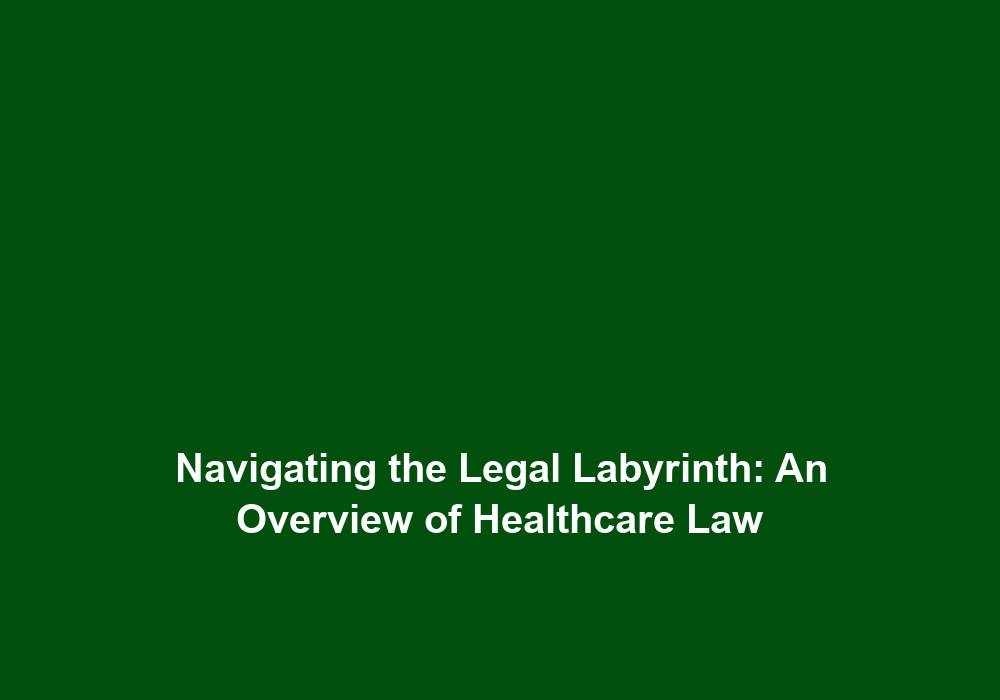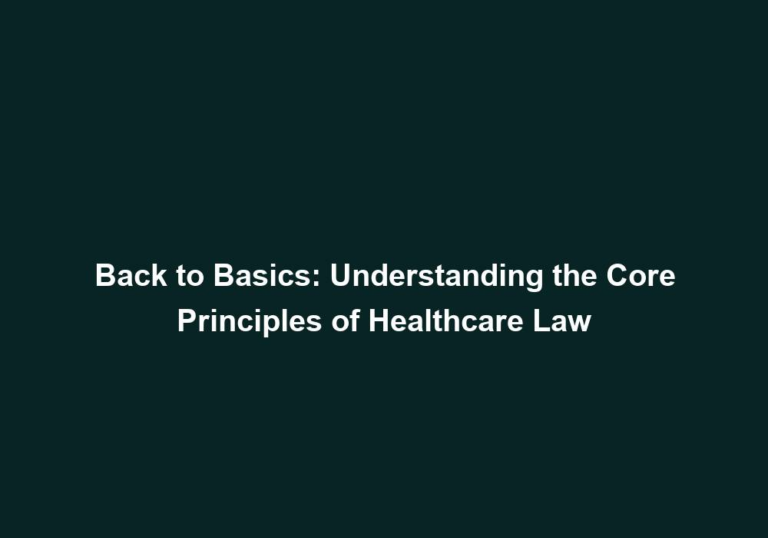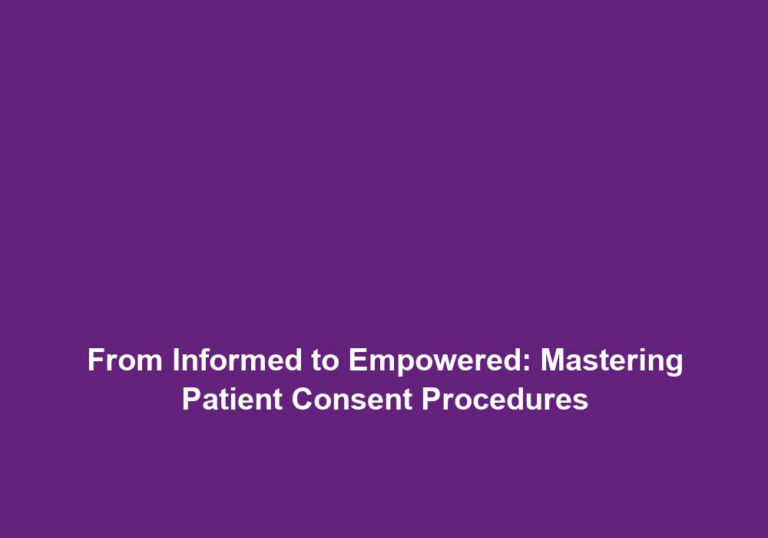Navigating the Legal Labyrinth: An Overview of Healthcare Law
In today’s complex healthcare landscape, understanding the legal framework that governs the industry is essential for all stakeholders involved. Healthcare law encompasses a wide range of regulations, statutes, and policies that aim to protect patients, healthcare providers, and the overall public health. This article will provide a comprehensive overview of healthcare law, highlighting its key components and their significance.
Introduction to Healthcare Law
Healthcare law refers to the body of laws and regulations that govern healthcare organizations, professionals, and patients. It encompasses a wide range of legal areas, including but not limited to medical malpractice, patient rights, healthcare fraud and abuse, privacy and security of health information, insurance, and reimbursement.
Healthcare law is a complex and multifaceted area that serves as the foundation for the healthcare industry. It provides a legal framework that ensures the delivery of safe, effective, and ethical healthcare services. By establishing standards of care and safeguarding patient rights, healthcare law plays a crucial role in protecting the well-being of individuals seeking medical treatment.
Importance of Healthcare Law
Healthcare law plays a crucial role in ensuring the delivery of safe, effective, and ethical healthcare services. It protects patients by establishing standards of care, safeguarding their rights, and providing avenues for legal recourse in case of medical negligence or malpractice. Healthcare law also governs healthcare providers, guiding their professional conduct and ethical obligations.
One of the key components of healthcare law is medical malpractice. This area of law sets the legal standards for filing medical malpractice claims, determining liability, and compensating affected individuals. It ensures that healthcare professionals and institutions are held accountable for their actions, providing a legal avenue for patients to seek justice and compensation in cases of negligence or misconduct.
Patient rights are another crucial aspect of healthcare law. These rights include the right to informed consent, privacy and confidentiality, access to medical records, and the right to refuse treatment. Healthcare organizations and providers must respect and protect these rights, ensuring that patients are fully informed and involved in their healthcare decisions. By upholding patient rights, healthcare law empowers individuals to make informed choices about their medical treatment and ensures that their autonomy is respected.
Key Components of Healthcare Law
1. Medical Malpractice
Medical malpractice refers to the negligence or misconduct of healthcare professionals or institutions that results in harm to a patient. Healthcare law establishes the legal standards for filing medical malpractice claims, determining liability, and compensating the affected individuals. It also outlines the requirements for expert testimony and the statute of limitations for filing such claims.
In cases of medical malpractice, the legal system aims to provide justice and compensation to patients who have suffered harm due to the negligence or misconduct of healthcare providers. Medical malpractice claims require expert testimony to establish the standard of care that should have been provided and demonstrate how the healthcare professional or institution deviated from this standard, resulting in harm to the patient. It is important for individuals who believe they have been victims of medical malpractice to understand their rights and seek legal advice to pursue a claim.
2. Patient Rights
Patient rights are fundamental to healthcare law. These rights include the right to informed consent, privacy and confidentiality, access to medical records, and the right to refuse treatment. Healthcare organizations and providers must respect and protect these rights, ensuring that patients are fully informed and involved in their healthcare decisions.
Informed consent is a crucial aspect of patient rights and healthcare law. It requires healthcare providers to inform patients of the risks, benefits, and alternatives to a proposed treatment or procedure before obtaining their consent. This ensures that patients have the necessary information to make informed decisions about their healthcare and allows them to actively participate in their treatment plans.
Privacy and confidentiality of health information are also protected by healthcare law. The Health Insurance Portability and Accountability Act (HIPAA) sets standards for the protection and confidentiality of patient health information. Healthcare providers and organizations must comply with these standards to ensure the secure handling and transmission of patient data, safeguarding patient privacy and confidentiality.
3. Healthcare Fraud and Abuse
Healthcare fraud and abuse are significant concerns in the industry. Healthcare law addresses these issues by prohibiting fraudulent activities such as billing for services not rendered, kickbacks, and false claims. It also establishes penalties for those who engage in fraudulent practices, aiming to protect the integrity of healthcare systems and resources.
Healthcare fraud and abuse can have serious consequences for individuals and the healthcare industry as a whole. It can result in increased healthcare costs, compromised patient care, and the misuse of valuable resources. Healthcare law plays a vital role in detecting and preventing fraudulent activities, ensuring that healthcare providers and organizations operate with integrity and accountability.
4. Privacy and Security of Health Information
With the increasing use of electronic health records and digital technologies, safeguarding the privacy and security of health information has become crucial. Healthcare law, particularly the Health Insurance Portability and Accountability Act (HIPAA), sets standards for the protection and confidentiality of patient health information. It also outlines the responsibilities of healthcare providers and organizations in ensuring the secure handling and transmission of such data.
The privacy and security of health information are essential to maintain patient trust and confidence in the healthcare system. HIPAA requires healthcare providers to implement measures to protect the confidentiality, integrity, and availability of patient information. This includes safeguards such as encryption, access controls, and regular risk assessments to identify and address potential vulnerabilities.
5. Insurance and Reimbursement
Healthcare law regulates insurance and reimbursement systems, ensuring fair and equitable access to healthcare services. It governs the establishment and operation of health insurance programs, including private insurance plans, Medicare, and Medicaid. Healthcare providers must comply with the legal requirements and reimbursement policies to receive proper payment for their services.
Insurance and reimbursement play a critical role in the healthcare industry, enabling individuals to access necessary medical services and ensuring healthcare providers receive appropriate compensation for their services. Healthcare law establishes the legal framework for insurance programs, outlining the eligibility criteria, coverage options, and reimbursement rates. It aims to strike a balance between affordability for patients and sustainability for healthcare providers.
Challenges and Controversies
Healthcare law is not without its challenges and controversies. Some of the key issues include:
-
Access to healthcare: Ensuring equitable access to healthcare services for all individuals, regardless of their socio-economic status or geographic location, remains a significant challenge. Disparities in access to healthcare can have profound consequences on individuals’ health outcomes and contribute to health inequities.
-
Rising healthcare costs: Balancing the need for quality care with the escalating costs of healthcare poses a continuous challenge for policymakers and healthcare providers. The rising costs of healthcare can create barriers to access, strain healthcare systems, and impact the affordability of insurance coverage.
-
Ethical dilemmas: Healthcare law often grapples with ethical dilemmas, such as end-of-life decisions, reproductive rights, and genetic testing, where different perspectives and values come into conflict. Balancing individual autonomy, societal norms, and ethical principles can be complex and contentious.
-
Evolving regulations: Healthcare law must adapt to the constantly evolving healthcare landscape, incorporating advancements in medical technology, telemedicine, and emerging healthcare delivery models. Keeping pace with these changes and ensuring regulatory frameworks that promote innovation while protecting patient safety and quality of care is an ongoing challenge.
Conclusion
Navigating the legal labyrinth of healthcare law is essential for all stakeholders in the healthcare industry. Understanding the key components, rights, and regulations can help ensure the provision of safe and ethical healthcare services, protect patient rights, and maintain the integrity of healthcare systems. By staying informed and complying with healthcare law, healthcare professionals and organizations can contribute to an effective and patient-centered healthcare environment.







